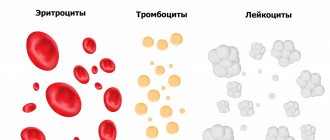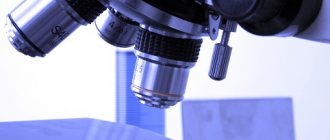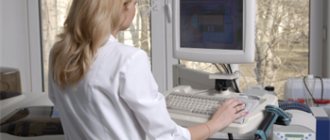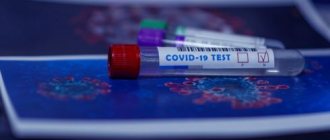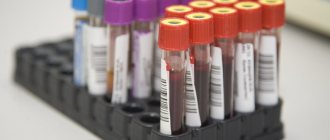Detailed description of the study
Platelets are nuclear-free blood cells, blood platelets. They are formed in the red bone marrow and remain viable for 7 to 10 days. Platelets have properties such as adhesion (the ability to stick to the vascular wall) and aggregation (the ability to stick together). These properties ensure the implementation of the main functions of platelets: hemostatic and angiotrophic. Platelets also contain some active substances and coagulation factors, which, when activated, are released into the blood.
The hemostatic function of platelets is the secretion of vasoconstrictor substances, the formation of a platelet plug when the integrity of blood vessels is disrupted, and the acceleration of the formation of a fibrin clot.
The angiotrophic function is that platelets supply growth factors for the cells of the vascular wall, necessary for its restoration. Therefore, thrombocytopenia is often accompanied by the appearance of pinpoint hemorrhages in the skin or mucous membranes. In addition, platelets perform a protective function by “gluing” (agglutination) bacteria.
Marked changes in the number of platelets in the blood can lead to various pathological processes: blood clotting disorders (thrombosis or bleeding), vascular fragility (the appearance of bruises and petechiae), and a decrease in the body’s protective properties.
Sometimes counting platelets in a complete blood count can be difficult. This is observed with a pronounced tendency of platelets to aggregation, with certain diseases, as well as with exposure to toxic substances.
In such cases, platelet count according to Fonio is recommended. The advantage of this method is that the platelet count is calculated per thousand red blood cells in stained blood smears. Then the resulting amount is recalculated in proportion to a certain volume using a special formula.
Preparing for blood tests
General rules for taking blood tests
- Most blood tests are done on an empty stomach: no less than 8 and no more than 12 hours after the last meal (biochemical tests, clinic, allergens, hormones, etc.). Any drinks other than water can distort the reliability of the result, as well as fasting for more than 12 hours and chewing gum.
- Be sure to refrain from fatty, rich foods and alcohol the day before!
- Do not smoke for at least an hour before taking blood!
- For most tests, it is preferable to take blood between 8 and 10 am.
- Avoid physical and emotional stress the day before and immediately before taking blood tests.
- If you are regularly taking any medications, it is necessary to indicate this in the direction for correct interpretation of the results.
- Blood tests cannot be given after physiotherapy, X-ray examinations, or major instrumental examinations (for example, recteromanoscopy and fibrogastroscopy).
Lipidogram
Carrying out a lipid profile requires more stringent conditions - strictly on an empty stomach (fasting for more than 12-14 hours). During forced fasting, you can only drink water.
Blood for sugar
Depending on the purpose of the study, it is carried out on an empty stomach (12-16 hours after the last meal) or after a meal (sugar load).
Blood for hormones
- The general rules are the same.
- For women of childbearing age, when prescribing a blood test for hormones, the doctor must indicate on what day of the menstrual cycle the test must be taken and note this in the referral.
It is recommended to take hormones of the reproductive system on the appropriate days of the cycle: LH, FSH - days 3-5 of the cycle; Estradiol - 5-7 or 21-23 days of the cycle; Progesterone - days 21-23 of the cycle; 17-OH-progesterone, DHEA-S, testosterone - days 7-9; Prolactin – exclude palpation of the mammary glands before the examination; AMH, Inhibin B - days 3-5 of the cycle. 3 days before taking blood, avoid intense sports training.
Blood for genes and genetic profiles
No special preparation is required for genetic research (except for analysis to determine the karyotype). Blood is drawn from a vein, not on an empty stomach. In exceptional cases, genetic testing using buccal scrapings is possible (see section “Scrapings, discharge”).
Blood for karyotype
Blood is drawn for karyotyping from a vein, not on an empty stomach.
2 weeks before the karyotype test, the married couple must exclude the influence of the following unfavorable factors on the hematopoietic system: 1. Taking antimicrobial and cytostatic drugs. 2. Taking glucocorticoid drugs. 3.Acute viral and bacterial infections. 4. Intoxication of the body (professional and household).
Rules for preparing for the analysis “Platelet aggregation”
To take a blood test for platelet aggregation ability, you need to follow certain rules to eliminate false results.
1. 10 days before donating blood, drugs that interfere with platelet function must be discontinued (by mandatory agreement with the attending physician): aspirin and aspirin - containing drugs (for example: thrombo ass, cardiomagnyl, citramon) and dipyridamole (for example: chimes). Please note: if your doctor has prescribed you a platelet aggregation test to evaluate the effectiveness of a drug you are taking (for example, aspirin), then the study is performed while you are taking this drug.
2. 4 days before the study (by mandatory agreement with the attending physician!) - it is necessary to discontinue non-steroidal anti-inflammatory drugs (NSAIDs, NSAIDs) (for example: ibuprofen, voltaren, indomethacin, Nise, diclofenac)
3. 24 hours before the test, you must avoid coffee, alcohol and smoking. As a last resort, smoking is allowed, but no later than an hour before the test.
4. The study is performed in the morning strictly on an empty stomach (except for pregnant women - they need a light protein breakfast - low-fat cottage cheese, yogurt).
5. You need to come to the study 15 minutes before the start in order to have time to fill out the questionnaire.
6. Before the study (a few minutes before), you need to drink 500 ml of still water. If you do not drink water from the cooler, you must bring water with you.
Coagulogram: tests
Activated partial thromboplastin time (abbreviated APTT)
Demonstrates the intrinsic pathway of blood coagulation. A screening study is prescribed to assess the state of the hemostatic system, if there is pathology in this system, to monitor treatment, especially with heparin, to diagnose antiphospholipid syndrome, hemophilia and other diseases in this category.
Fibrinogen
Fibrinogen is one of the blood clotting factors produced by the liver. Its concentration interests us in pathological conditions in the hemostatic system, as part of preoperative preparation, during pregnancy, as well as in the presence of cardiovascular diseases.
Antithrombin III
It is measured in case of hereditary deficiency of antithrombin III, in order to monitor the state of the hemostatic system during treatment with heparin and disseminated intravascular coagulation syndrome, during pregnancy and childbirth, as well as during planned surgical interventions. This enzyme of the anticoagulant system is activated much more quickly in the presence of heparin, and therefore this parameter must be monitored during treatment with this drug (heparin).
PTT/PTI, RFMC, INR, D-dimers, plasminogen and protein C, platelet aggregation and many other indicators are examined in a comprehensive assessment of the hemostatic system. Only a comprehensive and multicomponent blood test for hemostasis will allow us to study in detail each link of the system, identifying and preventing failures in it.
What you need to know about platelets?
Having received the result of the analysis, a person can independently recognize the presence or absence of problems by comparing it with normal indicators for his gender and age. But you need to remember that:
- Menstrual bleeding reduces rate in women
- During pregnancy, toxicosis or poor nutrition due to lack of appetite can cause the development of physiological thrombocytopenia.
Each platelet lives for about 10 days. If a patient takes several tests in a row and the cell count is reduced (less than 150x109) without pregnancy or menstrual bleeding, there is a reason to immediately consult a specialist - a hematologist.
Increased or decreased indicators
If there are more platelets in the blood than expected, this may be a symptom:
- Development of acute viral infections or exacerbation of chronic processes
- Tuberculosis
- Lymphogranulomatosis
- Anemic processes
- Oncology, including such varieties as hemoblastosis and leukemia.
If thrombocytosis is diagnosed as a result of the analysis, the patient is prescribed a diet with blood-thinning foods - fish, onions, apple cider vinegar, etc., as well as drinking plenty of fluids.
If the indicator is reduced, it is necessary to check for:
- Splenomegaly - pathological growth of the spleen
- Bacterial infections
- Autoimmune diseases
- Blood levels of folic acid and vitamin D.
In case of thrombocytopenia, the patient is advised to eat a diet high in vitamins A, C, K and P; alcohol and dishes with vinegar are not recommended. It is necessary to abstain from blood thinning medications whenever possible.
Why is it important to test your blood for platelets?
An insufficient number of anucleate cells (thrombocytopenia) increases the risk of bleeding. Their excess, thrombocytosis, provokes the formation of blood clots in the vessels and the development of such severe pathologies as stroke, heart attack and pulmonary embolism.
It is also important to check clotting during pregnancy, when the number of platelets decreases due to an increase in the volume of circulating blood. This will help prevent a number of serious obstetric complications, including blood loss during childbirth.
Norm and decoding
| Quantity, units/l | Clotting time, seconds | Aggregation, % |
| Newborn 100-420*109 | Men 180-380 | 25-75 |
| Adult 180-320*109 | Women 190-450 | |
| During pregnancy 150-380*109 |
A decrease in titers may be associated with Gaucher's disease, Werlhof's disease, aplastic anemia, thrombotic purpura. The increase is caused by HELLP and hemolytic uremic syndromes.
Impaired platelet adhesion and aggregation is observed in Bernard-Soulier, Germansky-Pudlak syndromes and von Willebrand disease.
If you need to undergo rare types of hemostasis studies or clarify the diagnosis, contact the MLC on Taganka. There is a 24-hour telephone line for scheduling tests and appointments.
How to prepare for the analysis?
To ensure that the result is as accurate as possible, we recommend following simple rules for preparing for diagnostics:
- Submit the material for examination on an empty stomach or 4 hours after eating. If the test is taken in the afternoon, you can include lean porridge in your diet in the morning. But it’s better to avoid fatty, fried and floury foods 72 hours in advance.
- Before donating biological material, reduce fluid intake to a moderate amount.
- For 2-3 days, minimize emotional and physical stress on the body.
- Discuss with the doctor who prescribed the examination the use of regular medications; if possible, exclude blood-thinning pills, such as aspirin, from their list.
Blood test for hemostasis: main indications:
- age category over 50 years;
- infertility;
- taking oral contraceptives/indirect anticoagulants, antiplatelet agents, heparins;
- miscarriage;
- excessively heavy menstruation;
- history of failed IVF attempts;
- at least two missed pregnancies in history or severe gestosis;
- cardiovascular diseases;
- signs of excessive bleeding;
- preoperative examination;
- examination before IVF, pregnancy;
- the presence of thrombophilia, hemophilia, etc.;
- assessment of liver function, etc.
What platelet tests should you take?
There is no separate test to determine platelet function and platelet count. These parameters are recorded during:
- general blood test - along with other formed elements, the number of anucleate cells in the plasma is counted;
- hemostasiograms - the vascular-platelet component of the hemostasis system is assessed by bleeding time;
- platelet aggregation test - induction (artificial stimulation) of cell gluing into blood clots under the influence of adrenaline, arachidonic acid, collagen or other substances.
Material for research is collected from a vein in the morning, on an empty stomach. You can drink a glass of water before taking the test.
Results are ready within 1 day.

